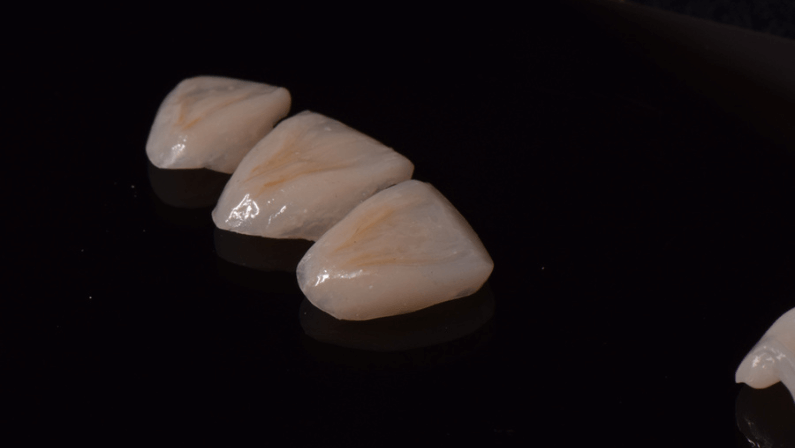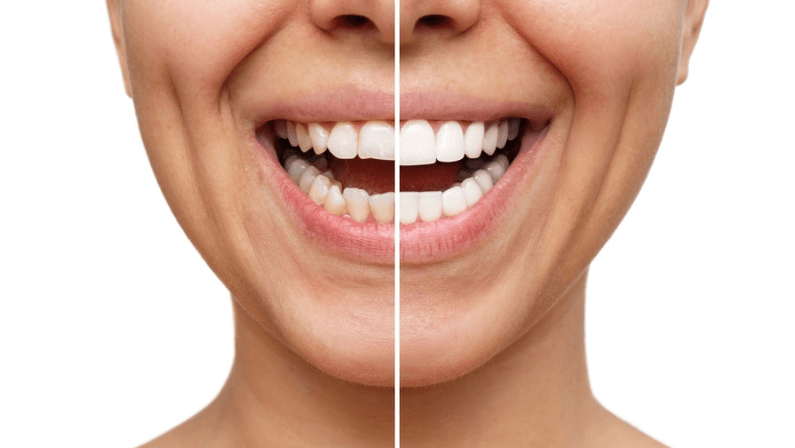Do you dream of a dazzling smile that lights up a room? If chipped teeth, discoloration, or minor misalignments are holding you back, composite veneers could be the answer. These versatile cosmetic dentistry solutions offer a beautiful and relatively quick way to revamp your smile.
This comprehensive guide explores everything you need to know, from what they are and how they work to their benefits, procedures, and aftercare. We’ll also shed light on how composite veneers compare to porcelain veneers and how long they typically last. By the end, you’ll be well-equipped to decide if composite veneers are the right path to your dream smile.
What Are Composite Veneers?

Composite veneers are thin shells custom-made from tooth-colored composite resin, a material similar to dental fillings. They are bonded directly to the front surface of your teeth to address a variety of cosmetic concerns. Unlike crowns, which cover the entire tooth, veneers only cover the front portion.
Composite veneers are gaining popularity for several reasons. First, they offer a more conservative approach compared to porcelain veneers. Since minimal tooth enamel needs to be removed for placement, they are a good option for those who want to preserve their natural tooth structure. Second, composite veneers can often be completed in a single appointment, making them a convenient choice for busy schedules. Additionally, the dentist can adjust the color of the resin during placement to achieve a natural-looking match to your surrounding teeth.
Types of Composite Veneers

There are two main types of composite veneers, each with its own advantages and applications. Understanding these differences can help you determine which type is best suited for your needs:
Direct Composite Veneers
These are applied directly to your teeth by your dentist in a single appointment. The dentist shapes and sculpts the composite resin to achieve the desired outcome. This approach offers a fast and convenient solution for minor cosmetic concerns.
Indirect Composite Veneers
These veneers are created in a dental lab based on impressions of your teeth. This allows for a more precise fit and may be a better option for addressing concerns like severe chipping, cracks, or misalignment. Indirect composite veneers tend to be slightly more durable than directly applied veneers.
Who Can Get Veneers?
Composite veneers are a versatile cosmetic dentistry solution for individuals who want to enhance the appearance of their smile and generally have good oral health. They can be a great option for those who have:
- Discolored teeth: Whether from stubborn stains that whitening treatments can’t tackle, fluorosis, or medication use, composite veneers can effectively mask discoloration and create a brighter, more uniform smile.
- Chipped or cracked teeth: Minor chips and cracks can not only detract from the aesthetics of your smile but also leave teeth vulnerable to further damage. Composite veneers can restore the integrity and appearance of chipped or cracked teeth.
- Gapped teeth: Small gaps between teeth can be addressed with composite veneers, creating a more symmetrical and aesthetically pleasing smile.
- Slightly misaligned teeth: For those with mild misalignment concerns, composite veneers can subtly reshape the front surfaces of the teeth to create a straighter appearance.
- Worn-down teeth: Over time, teeth can become worn down due to grinding or other factors. Composite veneers can restore the size and shape of worn teeth, improving both aesthetics and function.
However, it’s important to note that composite veneers may not be suitable for everyone. During a consultation, your dentist will assess your individual situation and oral health to determine if veneers are the right choice for you. For instance, individuals with:
- Severe tooth decay or gum disease: These issues need to be addressed before considering cosmetic procedures like veneers.
- Extensive tooth misalignment: For significant misalignment, orthodontic treatment (braces or Invisalign) might be a more appropriate solution.
- Habitual teeth grinding: The composite resin material may not be as durable as porcelain veneers for individuals who grind their teeth heavily.
A consultation with a qualified cosmetic dentist will help you determine if composite veneers can help you achieve your desired smile goals.
Composite Veneers vs. Porcelain Veneers

While both composite and porcelain veneers can enhance your smile, they have distinct advantages and disadvantages:
Composite Veneers Pros & Cons
Pros
- Less invasive procedure, requiring minimal removal of tooth enamel.
- Typically lower cost compared to porcelain veneers.
- Color adjustments can be made during placement for a more precise match to surrounding teeth.
- Often completed in a single appointment, making them a convenient option.
Cons
- May stain easier than porcelain veneers and require more frequent touch-ups.
- Less durable than porcelain veneers, typically lasting 5-7 years on average.
- May not be suitable for severe chipping or misalignment.
Porcelain Veneers Pros & Cons
Pros
- Highly stain-resistant, requiring minimal maintenance.
- Very durable, lasting 10-15 years on average.
- Offer a more natural, translucent appearance that closely mimics tooth enamel.
- Can address more significant cosmetic concerns like severe chipping or misalignment.
Cons
- More expensive than composite veneers.
- Require removal of a small amount of tooth enamel, making the procedure irreversible.
- The color is determined in a lab and may require additional appointments for adjustments.
- Generally require two appointments, one for preparation and impression taking, and another for placement.
How Much Do Composite Veneers Cost?
The cost of composite veneers can vary depending on factors like the number of veneers needed, your location, and the dentist’s experience. Generally, they are more affordable than porcelain veneers. A ballpark range would be between $400 and $1200 USD.
For an accurate estimate, it’s essential to schedule a consultation with a cosmetic dentist. During the consultation, your dentist can assess your individual needs and recommend the number of veneers required. They can then provide a personalized cost breakdown based on your specific situation and their practice’s fees.
Composite Veneers Procedure
The composite veneers procedure can be broken down into two main categories depending on the type chosen: direct composite veneers or indirect composite veneers.
Direct Composite Veneers Procedure
This is a more streamlined approach typically completed in a single appointment. Here’s a general outline of what to expect:
- Consultation: You’ll discuss your desired outcome and suitability for veneers with your dentist. They will examine your teeth and take X-rays to assess your oral health.
- Tooth Preparation: The surface of your tooth may be lightly roughened with an etching solution to improve the bonding process. This helps the composite resin adhere more effectively to your tooth enamel.
- Resin Application: Your dentist will skillfully shape and sculpt the composite resin onto your teeth, layer by layer, to achieve the desired shape and color. Throughout this process, they will constantly check the fit and color to ensure it blends seamlessly with your surrounding teeth.
- Curing and Polishing: Once the desired shape is achieved, a special light is used to harden the composite resin material. Finally, your dentist will polish the veneer for a natural-looking, smooth finish.
Indirect Composite Veneers Procedure
This approach typically involves multiple appointments:
- Consultation: Similar to the direct composite veneer process, you’ll have a consultation to discuss your goals and suitability for veneers.
- Tooth Preparation: Your dentist will lightly prepare your teeth in a similar way as with direct veneers.
- Impression Taking: An impression of your teeth will be taken to create a mold. This mold is then sent to a dental lab for the fabrication of your custom veneers.
- Temporary Veneers: While your permanent veneers are being crafted in the lab, you may be fitted with temporary veneers to protect your teeth and preview the cosmetic outcome.
- Veneer Placement: Once your permanent indirect composite veneers are ready, you’ll return for another appointment. Your dentist will ensure they fit properly and make any necessary adjustments before securely bonding them to your teeth.
How To Maintain Composite Veneers?
Maintaining good oral hygiene is key to keeping your composite veneers looking their best. Brush your teeth twice a day for two minutes each time and floss daily to remove plaque and bacteria. Regular dental checkups and cleanings (every 6 months) are also crucial for professional cleaning and monitoring your veneers’ condition.
To further extend their lifespan, limit staining foods and drinks, avoid smoking and tobacco use, and don’t chew on hard objects. These simple steps will ensure your veneers stay beautiful and function flawlessly for years to come.
Can Composite Veneers Be Done in One Day?
Absolutely! One of the significant advantages of composite veneers is the possibility of completing the procedure in a single appointment. This is particularly true for direct composite veneers.
During your appointment, your dentist will assess your needs, prepare your teeth, meticulously shape and sculpt the composite resin onto your teeth, and then cure and polish them to achieve a natural-looking result. This streamlined approach makes composite veneers a convenient option for busy individuals who value efficiency.
How Long Do Composite Veneers Last?
With proper care, composite veneers can last for a rewarding 5 to 7 years. This timeframe can vary depending on several factors, such as oral hygiene, diet, and habits. While they may not last quite as long as porcelain veneers (which typically last 10-15 years), composite veneers offer a more budget-friendly option and can be a great solution for those seeking a beautiful smile transformation.
Achieve a Smile Worthy of the Spotlight with Dr. Saif Shere at Brownstone Dental
Composite veneers are a fantastic way to transform your smile quickly and conveniently. They can address a variety of concerns, from stubborn stains to minor chips and gaps. The best part? In many cases, composite veneers can be completed in just one appointment!
If you are ready for a dental transformation, visit the best cosmetic dentist in Houston, Brownstone Dental! Our celebrity cosmetic dentist, Dr. Saif Shere, DMD, is a leader in veneer dentistry in Houston, TX, and has helped countless patients achieve their dream smiles using composite veneers.
Schedule a consultation with Dr. Shere at Brownstone Dental today and discover how composite veneers can take your smile from ordinary to extraordinary. Visit us at 9824 Fondren Rd, Houston, TX 77096, or book an appointment online today.